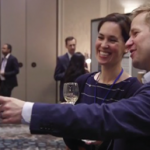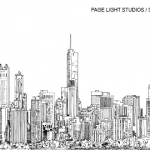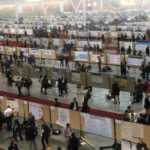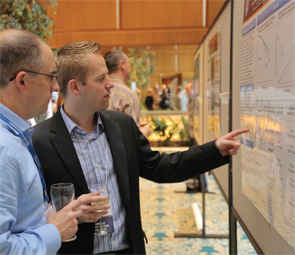
Investigators presented their latest findings, while emerging researchers gleaned valuable advice
If distributing close to $14 million in annual grant funding to rheumatology researchers is planting hundreds of seeds, what is the harvest? For David R. Karp, MD, PhD, current president of the Rheumatology Research Foundation, it’s a world full of thriving rheumatology research and better treatments for patients with rheumatic diseases. The results gained from years of support for innovative disease studies are easy to see, Dr. Karp said. He pointed to a room filled with established rheumatology researchers gathered to present groundbreaking findings that will lead to better treatments for people with rheumatoid arthritis (RA) and similar inflammatory diseases.
“The product of rheumatology research is you,” Dr. Karp told attendees of the Foundation’s annual Investigators’ Meeting. In just the past five years, those who have received grants through the Foundation’s Targeted Research Initiative have produced more than 230 publications in peer-reviewed scientific journals. “It’s the future of rheumatology, those papers you publish. Because of what you are able to do, we can go back and tell our funders, ‘Look how successful our grantees have become.’”
At the Rheumatology Research Foundation’s annual Investigators’ Meeting held in June at Seattle’s Fairmont Olympic Hotel, presentations included new findings on the possible pathogenesis of RA, new tools for measuring RA risk, information on heart-related risks from fatty tissue inflammation and theories on blocking cells that play a role in arthritis inflammation.
First Look at Potential Breakthroughs
Scientists from top institutions offered early peeks at the eventual results of their Foundation-funded research. These multi-year projects aim to develop a better grasp of the process of inflammation in the body, how rheumatologists may one day predict who will get arthritis and even how to stop inflammation before joint damage is seen.
- Several presentations focused on the role of T cells, which help the body fight diseases or foreign substances, in inflammatory arthritis. In her presentation on Th17 cells in RA, University of Pittsburgh researcher Mandy McGeachy, PhD, revealed how these cells may play a role in activating inflammation, and that in the future, this knowledge may help us predict a patient’s response to biologic drugs.
- In his presentation, Columbia University’s Jon Giles, MD, MPH, discussed how adipose, or fat, tissue inflammation in RA may be associated with a patient’s increased risk of cardiovascular disease and the possible connections between fat tissue and increased RA disease activity.
- Cherubism, a rare genetic disorder causing a swollen face, offered Brigham and Women’s Hospital researcher Antonios Aliprantis, MD, PhD, a way to explore how bone erosion happens in arthritis. Dr. Aliprantis discussed how he and his team studied the inflamed jaws of mice with cherubism to pinpoint the role of osteoclast cells, which break down bone, in bone erosion in other types of inflammatory arthritis.
The Foundation’s Targeted Research Initiative is now in its seventh year and has funded 123 research grants, mainly focused on RA, but also on other rheumatic conditions, such as juvenile idiopathic arthritis. “The future for rheumatology and our patients is bright,” Dr. Karp told the audience in Seattle. “Our work has led to new research areas and has stimulated a sense of camaraderie and collaboration amongst the arthritis researchers in this country.” He added, “The Rheumatology Research Foundation has a mission, and it is very patient focused. Why do we have a patient-focused mission statement? Because we fuel the engine of academic rheumatology.”
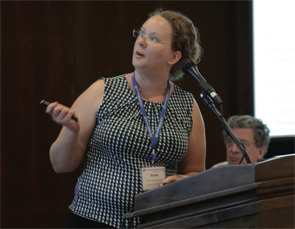
Practical Advice from Veterans
The veteran rheumatology researchers who were in Seattle to present their latest breakthroughs also had the opportunity to guide young minds interested in the field. The Foundation’s Investigators’ Meeting coincided with the ACR-hosted Rheumatology Research Workshop. The two events are held in conjunction with each other in order to help young scientists kickstart their careers. The workshop offered rheumatology fellows and junior faculty practical tips on applying for grants, job search and interviewing tactics, ways to nurture mentoring relationships and advice on recruiting research assistants. Young scientists also had the unique opportunity to get one-on-one advice from leading researchers at networking roundtables and practice their presentation skills in small workshops—without easels.
Young rheumatologists just starting their research careers gleaned valuable, practical advice from leading experts in the field at this year’s Rheumatology Research Workshop. Speakers used humor and straightforward tips to help fellows and others navigate the grant process and pursue their careers.
- In his keynote lecture, “Life, Liberty and the Pursuit of Research,” Stanley Pillemer, MD, emphasized the importance of mentors and encouraged the young rheumatologists in the audience to lean on their mentors as they build their careers. “Research is something you should consider to be happiness. It’s a wonderful opportunity to learn, explore and play,” Dr. Pillemer said. He spoke about the major strides made in rheumatology research during his career, which began when RA often left patients in wheelchairs. “In research, you’re climbing a cliff. You have to keep your wits about you and focus, focus, focus on what’s ahead, if you want to get to the top of the cliff on time.”
- In “Building Your Research Team,” the University of Colorado’s Steven M. Anderson, PhD, used an image of the popular ’80s TV show The A-Team to reflect why every research team needs doers, thinkers, funders, logistics experts, mentors, cheerleaders and collaborators. Although the lead researcher may be responsible for writing the grant, Dr. Anderson said, other team members may help create the project budget or a strategy for disposing of hazardous waste, the types of details that research grants require.
- As director of rheumatology at Columbia University, Joan Bathon, MD, offered young researchers tips on how National Institutes of Health study sections work. These important groups review grant applications for the bulk of American disease research. She urged the attendees to mine any knowledge they can from their mentors before applying for an NIH grant, and be careful and accurate with wording in their applications.
A Young Investigator’s Perspective
Jeffrey Sparks, MD, MMSc, a third-year rheumatology fellow at Brigham and Women’s Hospital in Boston, attended this year’s ACR Rheumatology Research Workshop on scholarship and shared his experience of the weekend:
“While preparing my Rheumatology Research Workshop abstract in January during a particularly harsh Boston winter, attending a conference in Seattle in June sounded like an especially enticing idea, since Boston winters have been known to sometimes last until early July. My abstract consisted of preliminary data on RA and mortality in the Nurses’ Health Study with my research mentor, Elizabeth Karlson, MD. The timing of the workshop provided the perfect opportunity to present this project and receive feedback from senior investigators prior to preparing my abstract for the ACR Annual Meeting. I was happy to receive notice of acceptance in April, and by the time June came, I was ready to print my poster and head to the refreshing air of the Pacific Northwest.
“In the airport, I ran into multiple faculty members of my division also headed to Seattle on the same flight. I did not realize until that moment that the ACR Rheumatology Research Workshop coincides with the Rheumatology Research Foundation Investigators’ Meeting. Everyone who receives a targeted research grant from the Foundation attends the Investigators’ Meeting. This further provides ample opportunity for eager young investigators to network with established senior investigators and to learn the nuances of successful grantsmanship and career development.
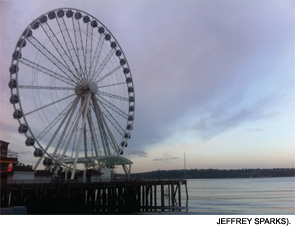
“The most unique and fulfilling part of the workshop from my perspective was the abstract discussion groups. These groups provide an opportunity to give an impromptu chalk talk of your abstract to other workshop attendees, facilitated by two senior investigators. My group consisted of members on the entire spectrum of medical training: medical students, residents, fellows and junior faculty. Sheila Angeles-Han, MD, MSc, of Emory University, and William Rigby, MD, of the Geisel School of Medicine at Dartmouth, moderated my session. While I had previously given poster and oral abstract presentations, I had never before presented an abstract with only a marker and a blank whiteboard behind me. I had always relied on having meticulously prepared tables, figures and slides to hide behind. But that was exactly the point—to concisely communicate the big picture of the background, methods, results and implications of a project so that it is understandable and interesting to a wide audience without relying on these crutches. I was impressed at the proficiency and innovation of all the projects in my group and learned details of abstracts that I never would have noticed from a poster. The abstract group was extremely helpful in improving skills to communicate scientific findings to a wide audience and will certainly change the way I approach talks in the future.
“The discussion groups segued perfectly into the poster session that evening. After the abstract discussion session, there was an air of camaraderie and relief not usually evident at poster sessions. This was only enhanced by the opulent, open space at the Fairmont Hotel and the cocktails being served conveniently close to my poster. I have attended poster sessions before, but this was by far the most engaging and fun session I have ever experienced. The Foundation investigators also attended the cocktail/poster session, so it was the perfect opportunity to introduce myself to leaders in the field with my poster as a backdrop.
“I had a long discussion at my poster with Jane Buckner, MD, of the nearby Benaroya Research Institute, who happened to be the featured speaker, detailing her research career during the dinner that followed the poster session. The ballroom was magnificent, with gold-trimmed pillars and balconies, and I felt transported from Seattle to Spain. At that moment, I thought that I had singlehandedly vanquished the long and arduous Boston winter with my decision to apply for this workshop. By this point, the ACR Research Workshop and Foundation Investigators’ Meeting attendees had effectively merged into a single, well-fed group.
“The next morning, we resumed a relaxed poster session over breakfast, and I was able to visit the remaining posters and presenters I was unable to see the night before. The rest of the morning consisted of presentations from the Foundation investigators. It was impressive to see many diverse projects, ranging from basic science to clinical trials to biomarkers, in varying stages of development. In particular, I was intrigued to hear details of an ongoing clinical trial at the University of California, San Francisco on adalimumab and cardiovascular risk among RA patients given by Jonathan Graf, MD. Other highlights included an interesting talk on trogocytosis, the “shaving” of cell surface antigens, after rituximab by William Rigby, MD, and the preclinical development of autoimmunity in RA by Kevin Deane, MD, PhD, of the University of Colorado, Denver.
“The second afternoon of the workshop was devoted to career development strategies. Over lunch, we had a speed mentoring session followed by a series of lectures providing important practical advice on how to succeed in academics. There were two concurrent sessions—one aimed at fellows/residents and the other aimed at junior faculty. I must admit that I wish I had attended the fellow session one year earlier as a second-year fellow, because it directly addressed many research obstacles that I had grappled with by myself at that time. These topics included grantsmanship, preparing for the ACR Scientist Development Award, mentorship and advice on the NIH K award. The junior faculty session gave tips on the NIH R award as well as assembling collaborations and research teams. The entire workshop then regrouped to hear insider tips on study sections from Joan Bathon, MD, of Columbia University and negotiating academic jobs from Stephen Anderson, PhD, of the University of Colorado, Denver.
“Set in the backdrop of beautiful Seattle, the ACR workshop also provided me a chance to visit a new city. While I have always heard [about] the Seattle stereotypes of rain, clouds and flannel, none of this was evident during my visit. The hotel was within walking distance [of] the piers on Puget Sound, and I made sure to take my morning runs along it. I feasted on West Coast seafood in a dinner with senior members of my division, as well as with old and new friends from across the country.
“For anyone, especially fellows, interested in pursuing a career in academic rheumatology, the ACR Rheumatology Research Workshop is a must-have on your conference calendar. The workshop showcases and hones research and presentation skills, while also providing practical advice on how to succeed in academic rheumatology—all in an intimate and relaxed setting. If you do decide to attend, I look forward to discussing your poster over cocktails at next year’s workshop, wherever that may be.”
